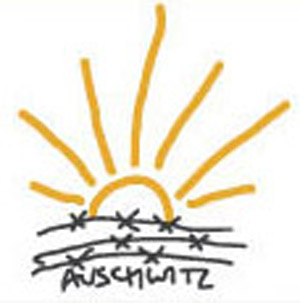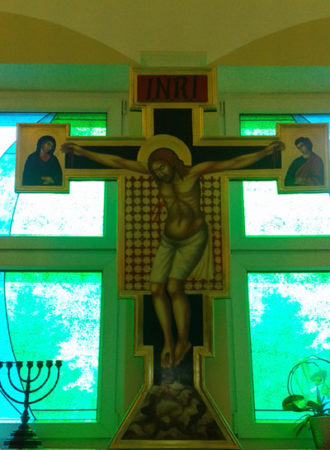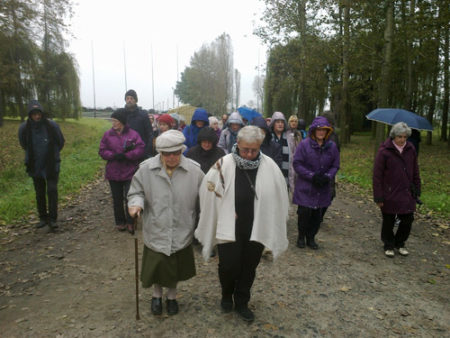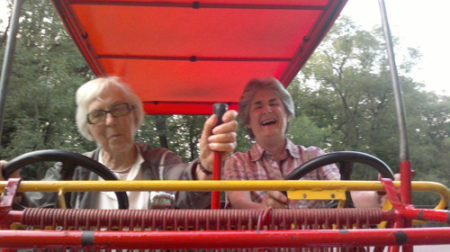 Centre for Dialogue and Prayer logo
Centre for Dialogue and Prayer logo
Life in the Centre for Dialogue and Prayer located at the edge of Auschwitz has its own surprises even on a daily basis.
During mid-June, 2018, groups from Germany, Japan, Norway, the United States, Netherlands and a few individuals from Poland stayed in the centre. My responsibility was mainly with the Japanese group. The group is called Peace Boat. It is a cruise liner that sets out from Japan for 100 days around the world. It is an educational, anti-nuclear peace cruise. Having docked at a European port the participants can choose a country to visit. Peace Boat has included Auschwitz on their itinerary for many years. This time twenty persons arrived, mainly young adults in their twenties. They included a person from Nagasaki and a person from Hiroshima, places where the atom bombs were dropped. I accompanied the group when needed during their stay. One of the young people told me she was Christian and she wished to pray in the chapel. The two main religions in Japan are Shinto and Buddhism with Christianity only about 2% of the population. The film Silence gives a good insight into the work of the early Jesuit missionaries in Japan, though it is not an easy film to watch. When this young woman entered the chapel she began to weep. This was not the first time I witnessed tears from a Christian participant of Peace Boat (sometimes Catholic, sometimes Protestant) visiting the chapel. Somehow they feel very much ‘at home’ in the presence of the cross, and their prayer is expressed in tears. It is a very moving moment to be part of and also a privilege. Language is never a problem because it becomes a language of the heart that we each understand.
 Cross in the chapel in Auschwitz
Cross in the chapel in Auschwitz
This was a week when we remembered the first prisoners who arrived in Auschwitz on 14th June, 1940. They were Polish prisoners and they arrived before the time of the mass transports of Jews from across Europe to Auschwitz. Before attending the special commemoration ceremonies in the camp, two survivors came to the Centre for a cup of coffee, Mrs. Zdzislawa and Mr. Machulik. In the short time that we had over coffee, Mr Machulik told his story. He was born in the camp on 21st July, 1944. Very few babies born in Auschwitz survived because the policy was to murder the babies, the unborn, and the newly born. Mr Machulik survived only because a Polish Nurse, Stanislawa Leszczyska who was a prisoner and midwife, helped his mother in childbirth, took care of both mother and baby as best she could, hiding both when necessary. This nurse saved many babies who otherwise would have been cruelly murdered and send to the crematorium. Her orders were to make sure no babies survived. At great risk she disobeyed the order. She and her daughter had been transported to Auschwitz because she helped Jews in the Lodz ghetto and provided them with false documents and food. Mr Machulik’s mother, a young woman of 18, was forcibly taken from her home and sent to Germany as a farm worker after Poland was invaded and occupied. Her future husband was a German soldier stationed in a military barracks near the farm. Somehow they met and he told her he was going to desert. She hid him on the farm and fed him. They were betrayed and he was sent for ‘re-education’ and then to the Eastern front. Mr. Machulik’s mother was sent to Auschwitz in reprisal. She was already pregnant. Both parents and baby survived and after the war they were reunited. To listen to a survivor’s story is always very moving. Even if the telling is brief, for me the encounter brings with it the responsibility to witness to the truth of what happened here, even though I was born after the war. But the responsibility is also about more, it is to create the opposite of Auschwitz, to contribute to a civilization of love where the dignity of each person is honoured. In small concrete ways, at the edge of Auschwitz that is what we try and do here. As Pope Francis said at the Angelus on Sunday June 17th : “The Lord offers us occasions to be involved in his dynamics of love, of welcoming, and of mercy toward all. It is up to us to be aware of those opportunities”.
 Group on retreat 2016
Group on retreat 2016
The week also brought news that a survivor of Auschwitz whom we knew well, Helena Niwinska, died just short of her 103rd birthday coming up at the end of July. She invited the sisters who came on retreat during the Year of Mercy 2016 to accompany her to the camp, to the ruins of the gas chamber and crematorium where her mother died, to pray and light a candle there. All was done in reverential silence. It was a poignant time. Both Helena and her mother were brought to Auschwitz in 1943 after time spent in prison. Helena grew up in Lwow, present day Ukraine and now called Lviv. Formerly it was part of Poland. Her father died in the early days of the war. Lwow was first occupied by the Soviet Red Army and then by the Germans. There was extreme deprivation. The Gestapo arrived to their home and arrested both Helena and her mother. They were in prison under interrogation for eight months. From prison they were sent to Auschwitz. One brother had already joined the resistance and another who was completing his doctorate managed to reach England. Helena survived Auschwitz mainly because as a professional violinist she was appointed to the ‘camp orchestra’. Life was as harsh in the orchestra as it was for other prisoners who were selected for slave labour. Helena lost both parents, the brother who joined the resistance, and also her home in Lwow. After the war Lwow became part of the Soviet Union and Poles were expelled. Helena made Krakow her new home town. Even at an advanced age she lived independently on her own. Her apartment was on the fourth floor, and although it had no elevator this did not deter her from going up and down the many stairs with the support of good friends. Early this June she enjoyed a holiday in the mountains. Sadly she had a fall after returning home and did not recover. She was a beautiful person and always said, “I have no hate”. She prayed a lot, wrote her memoirs in the last few years, and had great appreciation for life, friendship, peace and reconciliation.
 A lighter moment – Helena and Mary O’Sullivan
A lighter moment – Helena and Mary O’Sullivan
Mary O’Sullivan rsm
South Central Province


